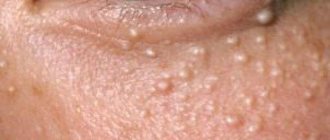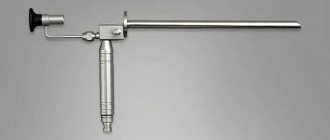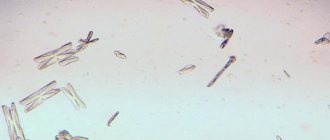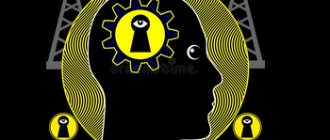Schizophrenia has many varieties. It is classified according to the rate of progression, characteristic symptoms, intensity of symptoms and other characteristics. In total, this pathology affects 0.5-1% of the population. One of its rare subtypes is hebephrenic schizophrenia. It is detected in 5% of patients with similar disorders. We will tell you what the features of hebephrenia are, how it arises, develops and is treated.
In this article
- History and main features
- Causes
- Symptoms
- Clinical cases
- Diagnostics
- Treatment
- Forecast
History and main features
The term “hebephrenic paraphrenia” was first used in 1871 by Ewald Hecker. In describing this disorder, he mentioned that it is “a special form of terminal dullness, the signs of which can be recognized in the early stages of the disease.” The pathology received its name in honor of the ancient Greek goddess of youth Hebe.
Today, the equivalent concepts of “hebephrenic schizophrenia”, “hebephrenic schizophrenia” and “hebephrenia” are used. You can also come across the term “schizophrenia of the disorganized type.” It is outdated, but in the literature you can still find the formulation “disorganized schizophrenia.”
The main feature of this disease is that the patient behaves like a child, even if he is an adult. In general, his behavior is inappropriate, foolish and mannered. Sometimes it is very ridiculous and obscene. The patient constantly giggles, smiles smugly, grimaces and plays pranks.
The onset of pathology usually occurs at 15-25 years of age. Residents of large cities often suffer from it. The incidence of development in women and men is approximately the same. The disease is not common. In its pure form, that is, without signs of other forms and types of schizophrenia, it is observed in only 5% of patients.
The schizophrenic defect in hebephrenia develops quickly, the pathology progresses rapidly, and is difficult to treat. There is a high probability that the patient will lose his purpose in life, and his existence will become meaningless.
Hebephrenic schizophrenia signs and symptoms
In order for a diagnosis to be made, the symptoms of the disease must correspond to at least one of these signs, common to some types of schizophrenia:
- the presence of “voices” that comment on the behavior and actions of the sick person, as well as their various types, sounding from different places in his body;
- the patient’s confidence that his thoughts are open to others, the belief in the insertion or removal of thoughts, their echo;
- delusion of mastery and delirium of perception;
- persistent inadequate nonsense, absurd and grandiose in nature.
But there are a number of other symptoms that can be observed in patients with hebephrenic schizophrenia.
The onset of the disease is mainly associated with inappropriate behavior, in which one can observe:
- deliberate mannerism;
- foolishness, pranks, mood close to hyperexcitability;
- complacency and brutality;
- an unreasonable smile, a giggle that turns into uncontrollable laughter;
- swearing, obscene language;
- health complaints of the hypochondriacal type;
- catatonic behavior;
- apathy or delusions of persecution;
- persistent hallucinations.
It may seem that the patient is simply pretending, portraying a harmful child. Sometimes he plays with toys or grabs strangers' hands, talks animatedly to himself or swears. The mental development of the patient stops forever. He can only speak on topics that he once learned in the past.
The sexual component of the disease is clearly expressed. The pathology manifests itself in unusually early puberty, increased sexuality, exhibitionism and casual sexual intercourse. Patients may develop abnormal sexual desires.
Causes
Doctors name several reasons that could hypothetically lead to or provoke hebephrenia:
- genetic abnormalities;
- fetal hypoxia;
- intrauterine infections;
- epilepsy;
- childhood psychological trauma.
These are predisposing factors. It is clear that it is difficult to call them direct culprits, since their presence only increases the risk of developing the hebephrenic form of schizophrenia. The impetus for the appearance of the first signs may be:
- child abuse;
- unhealthy atmosphere in the family;
- constant stress;
- bullying at school;
- brain diseases of various etiologies;
- alcohol and drug use.
Medical practice shows that patients with hebephrenia in infancy have low weight, low intelligence and strong involuntary reactions to stimuli.
Also, children who are subsequently diagnosed with hebephrenic schizophrenia differ in:
- persistent antisocial characteristics;
- overly exemplary behavior;
- dependence on adults;
- increased sensitivity;
- lack of communication;
- reluctance to perform mental work;
- general lethargy and passivity.
In addition, patients with hebephrenia experience early sexual intercourse, problems with the law, and other antisocial behavior. They are prone to rebellion, disobedience, and drug and alcohol use. In other words, they behave deviantly.
Symptoms
The onset of the disease is difficult to distinguish from bad or ill-mannered behavior. The patient is fooling around, making faces and saying stupid things. But outsiders should be wary of the complete lack of logic in his words and actions. He also often complains of various illnesses, which indicates hypochondria. Sometimes a person can be aggressive. In general, his mood is excessively elevated, but is often replaced by apathy.
The main symptoms of hebephrenic schizophrenia:
- Disorganized thinking. The patient cannot formulate and logically justify his thoughts. Because of this, he jumps from one topic to another, without being able to stop at one thing. In some cases, his speech is so confused and incomprehensible that others perceive it as a set of sounds.
- Disorganized behavior. A patient with hebephrenia may constantly make some movements, as if he has nowhere to put his hands. He puts them behind his head, straightens his socks, scratches himself, knocks on the table with his fingers, etc. In severe cases, he is unable to perform ordinary everyday activities - wash, shave, get dressed. Some patients behave childishly and stupidly, but sometimes they behave aggressively.
- Sexual deviation. We are talking about displaying genitals and defecating in public places. Also, patients with hebephrenia love to joke obscenely, and at the level of an eighth-grader who giggles in biology lessons. In general, the sexual topic is of great interest to the patient, like any child during puberty.
- Inadequacy of emotions. The patient can be either overexcited or extremely apathetic. Sometimes his face shows no emotion at all, as if he feels nothing. But at the same time, at any moment he can laugh out loud, and in any place, for example, in a lesson or an important event.
- Misconceptions With hebephrenic schizophrenia, a person may be at the mercy of false beliefs that are formed as delusions. It seems to him that he is a great person or that someone is constantly chasing him.
- Self-isolation. Gradually the number of contacts with people is reduced. The patient interacts less and less with others, including loved ones. It is not only the lack of interest on the part of the patient that interferes, but also poor social skills.
- Unawareness. In this case, we are talking about the fact that the patient does not consider himself sick. At the same time, he can easily explain his condition or stay in the clinic: “my parents wanted it,” “the doctor advised me,” “the pills are making me a fool,” etc.
Most often, relatives of the patient turn to doctors, since the latter considers himself “normal.”
Delusions and hallucinations, which are typical signs of almost any schizophrenia, may be absent in hebephrenia.
In severe forms, catatonic and manic syndromes, delusions, hallucinations and severe hypochondria are observed. Symptoms such as depersonalization and derealization may be recorded, when the world around us seems unreal. Foolishness gives way to apathy, speech becomes more and more meager and primitive over time. Some patients become very interested in religion, philosophy, or a narrower topic, for example, the work of the subway.
Features of the disease
Hebephrenic schizophrenia, a disease that has several features that distinguish it from other forms.
- Pronounced symptoms. However, delusions and hallucinations, the main signs of schizophrenia, remain secondary and never come to the fore.
- Irreversible nature. Most patients eventually experience behavioral deformation and personality degradation.
- Does not respond well to medication and psychotherapy.
Clinical cases
With hebephrenic schizophrenia, the patient does not feel shame, he has no sense of responsibility or caution. He may behave defiantly, ask tactless questions without expecting an answer, giggle and use foul language. Almost constantly, such patients laugh at their own jokes. Moreover, their laughter seems unnatural, childish, feigned.
A typical example is the development of hebephrenia in a 14-year-old teenager. Until this age, he was diligent and obedient, studied well, and was raised in a complete family without relatives with mental disorders. During puberty, behavior deteriorated.
The patient stopped attending school, wandered around the city, undressed and pestered passers-by, began to smoke and drink alcohol. He categorically refused hygiene procedures, was often rude, showed his genitals to others, and attempted to defecate in the middle of the room. He was forcibly hospitalized.
Another example is a 19-year-old boy. I was admitted to the clinic with the typical symptoms of hebephrenia described earlier. During conversations with the doctor, he constantly made faces and periodically inserted obscene jokes into his speech. In general, I reasoned relatively normally. He remembered the dates and talked enthusiastically about the metro system. When I tried to remember all the stations, I got confused. The doctor tried to change the conversation to another topic, but the patient showed signs of aggression.
The patient believed that the state paid him a very small disability benefit, and the pills made him “a fool.” During the conversation with the doctor, he always moved his hands and fidgeted in place. Demonstrated the behavior of a 10-year-old child. To the question “why is he in the clinic?” answered that he was “crazy.”
The third example is a 16-year-old teenager. He was raised by his mother, and a very suspicious woman. One of the relatives was treated in a psychiatric clinic. He developed normally until the age of 12. He showed success at school, was distinguished by curiosity, and had good characteristics.
However, the teenager suddenly became rude and disobedient. At the age of 14, I began to develop very quickly physically. Signs of sexual deviation appeared. He began to consider himself a freak, made faces in front of the mirror for a long time, and became addicted to gambling.
Over time, he became more and more undisciplined, hypochondria developed - he forbade his mother to touch food, as he was afraid of infection. He was hospitalized at the age of 16 from the street when he was walking around naked.
Diagnostics
To accurately diagnose hebephrenic schizophrenia, you will have to observe the patient in a hospital for several weeks or months, depending on the condition for which the patient was hospitalized. As a rule, the question of hebephrenia arises when the foolishness does not go away within a month from the first day of observation. The following criteria are also used:
- there are no obvious delusions or hallucinations;
- there is a speech disorder;
- there are signs of mindless behavior.
It is important to carry out differential diagnosis. First, tumors of the frontal lobes of the brain, infectious inflammation, dementia due to Pick's disease (atrophy of brain structures) and Huntington's chorea (a disease of the nervous system) should be excluded. For this purpose, CT, MRI, EEG and fundus examination are prescribed.
If schizophrenia is suspected, the medical histories of relatives are always checked, since this pathology is often genetically determined.
Secondly, it is necessary to differentiate hebephrenic schizophrenia from hebephrenic syndrome, which can develop both within schizophrenia and as a separate disease against the background of epilepsy. The syndrome occurs with hallucinations, delusions and catatonia, and is also characterized by the following symptoms:
- contraction of facial muscles, grimacing;
- lack of motives in actions;
- causeless euphoria, elation.
The syndrome can lead to the development of schizophrenia or occur against its background, but this is not necessary. It all depends on how early treatment began.
Thirdly, it is necessary to distinguish hebephrenia from heboid psychopathy, which has similar symptoms, but occurs in a milder form.
Historical aspect
Hebephrenia was first described as a separate mental illness by the English psychiatrist Ewald Hecker in 1871. He noted that it develops during puberty, begins with weakness and ends with pronounced dullness.
In 1898, the German psychiatrist Emil Kraepelin at the Heidelberg Congress identified this disease as hebephrenic schizophrenia. So it was listed in the DSM-II (American Diagnostic and Statistical Manual of Mental Disorders) until 1980, when DSM-III was published. According to him, the pathology was renamed schizophrenia of the disorganized type.
Hebephrenic schizophrenia was first described back in 1871
Diagnosis of the disease is difficult, since the symptoms are difficult to differentiate from other similar personality disorders. The behavior of patients is unpredictable and uncontrollable. Treatment gives only a temporary effect. The prognosis is unfavorable. Therefore, today the problem of studying hebephrenia is relevant. There is little research on it and not enough to help those who suffer from it.
Treatment
Therapy includes three areas: relief of symptoms, stabilization of the condition and prolongation of remission. To get rid of symptoms, the patient is prescribed antipsychotics and other drugs. In extreme cases, insulin comatose therapy is carried out, based on the artificial introduction of a person into a hypoglycemic coma.
Stabilizing treatment of hebephrenic schizophrenia is aimed at consolidating the result after relief therapy. For this purpose, antipsychotic drugs are prescribed in minimal dosages. If there is a catatonic syndrome, large doses of tranquilizers are administered intravenously.
The patient is in the hospital during treatment. Subsequently, he may be discharged, but he will have to take antipsychotics constantly. The patient status remains forever. The main task is to prolong remission. Individual work continues with the person. He sees a psychotherapist and sometimes goes to group sessions. Nursing care is important. Specially trained caregivers and nurses care for such patients.
At the same time, conversations are held with relatives, who need to be taught how to properly communicate with a schizophrenic. The problem is that any factor, even a minor one, can provoke a new attack, for example, a minor quarrel, conflict between spouses, divorce, etc.
In general, after successful therapy, the following effects can be achieved:
- prolongation of remission;
- increased performance;
- return of interests;
- reduction of aggression;
- improving quality of life.
If necessary, the doctor lowers or increases the dose of the drug.
Treatment – main difficulties
The main problem in the treatment of hebephrenic schizophrenia is its ineffectiveness. To get rid of the symptoms of the disease, the patient is prescribed various combinations of drugs in large dosages, which are changed several times during therapy. Drug therapy usually includes:
- antipsychotics - they are aimed at correcting behavior and cognitive functions, preventing attacks of aggression;
- neuroleptics – “mute” the impulsiveness of the patient’s actions and actions;
- mood stabilizers and antidepressants – eliminate sudden mood swings;
- tranquilizers – eliminate psychomotor agitation, regulate emotional reactions.
If medications are not effective in relieving your symptoms, your doctor may prescribe anticonvulsant therapy.
Drug treatment is carried out only inpatiently. You can use the services of our clinic. We will help you with transportation and accommodation of the patient - in 2-, 3-bed wards, in VIP rooms or without sharing. During the entire treatment period, the patient will be under constant medical supervision.
If a state of remission is achieved, the course of treatment is supplemented with psychotherapy . Individual or group training with a psychiatrist allows the patient to understand his illness, the characteristics of its manifestations and, if possible, control his actions and emotions.
Forecast
The prognosis for hebephrenic schizophrenia is disappointing. The chances of a positive outcome are minimal. In addition, this pathology develops rapidly. Treatment usually begins when the patient is at the stage of severe exacerbation.
The patient should be shown to a specialist much earlier - when the first changes in behavior appear, especially in cases where there is a serious contrast. So, if a teenager was always obedient and studied well, but suddenly began to be rude to everyone and neglect his studies, it is recommended to at least consult a psychologist.
However, even when treated at an early stage of the disease, the effect is often temporary. It becomes increasingly difficult for the patient to control outbursts of anger. He gradually withdraws into himself and loses touch with the outside world. 2-3 years after the onset of the disease, an irreversible defect in emotional and volitional qualities occurs. It is necessary to isolate a person from society forever, since he poses a danger to himself and others.
In fact, the only thing that can be done is to maintain the remission phase for as long as possible. But in most cases, relapse cannot be avoided, since the pathology leads to serious destruction of the brain. In this case, the second exacerbation will be more severe than the first.
Story
The first monograph describing “hebephrenic paraphrenia” was described in 1871 by Karl Ludwig Kahlbaum’s student Ewald Hecker .
), but was published only in 1985 in French. This paper describes this disorder as follows:
| occurrence during the onset of puberty... a rapid outcome to a state of mental weakness and a special form of final dullness, the signs of which could be recognized in the first stages of the disease [1] |
In 1893, E. Kraepelin defines the identity of “hebephrenic paraphrenia” described by Hecker and “démence précoce” by B. Morel. At this time, the term “demetia praecox” appears for the first time in the literature, but refers only to hebephrenia. It was not until 1898 at the Heidelberg Congress that dementia praecox was defined by Kraepelin as a group of three endogenous processes that weaken the mind (in catatonic, paranoid and hebephrenic forms)[2].
This mental disorder was named after Hebe, the goddess of youth in ancient Greek mythology. The American Diagnostic and Statistical Manual of Mental Disorders, Second Edition (DSM-II) had a diagnostic category of “schizophrenia of the hebephrenic type.” In DSM-III, it was renamed “schizophrenia of the disorganized type”, and no explanation was provided for this renaming [3].
Complications
The consequences of hebephrenic schizophrenia can be of two types. The first is the collapse of personality and withdrawal into oneself. A person's life loses any meaning. This option is described above.
The second group of complications is associated with the period of development of pathology before hospitalization. Due to hypersexuality, irresponsibility and aggressiveness of the patient, as well as due to the lack of a sense of shame, the following scenarios are possible:
- violation of the law (theft, sexual violence, etc.);
- alcohol abuse and drug use;
- dismissal from work, expulsion from the institute;
- promiscuous sexual intercourse;
- suicide attempts.
Convincing a patient to see a psychotherapist is quite difficult. Experts advise involving people who are an authority for the child. Perhaps he will listen to them. If there are none, call a doctor at home. Experienced doctors know how to persuade such patients to undergo examination. Otherwise, a person is forcibly hospitalized after committing a crime or attempting suicide.










